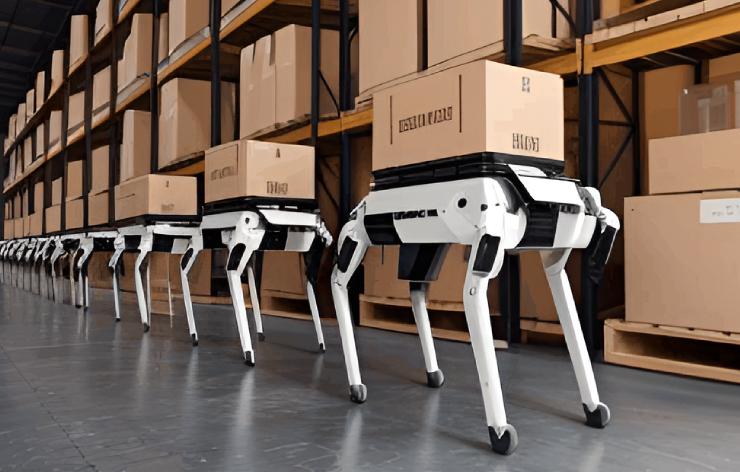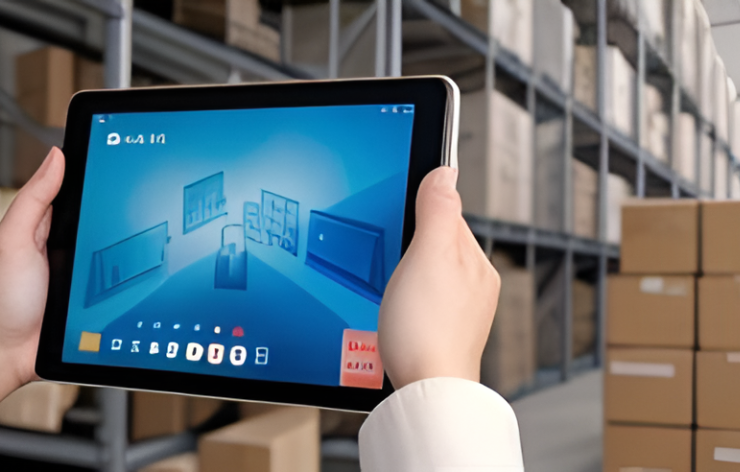Artificial Intelligence and Logistics
Artificial Intelligence and Logistics

Welcome to a new horizon in international logistics, where technology and innovation converge to perfect every link in the supply chain. At D-Log, we are fervently committed to offering pioneering solutions in global freight transportation and relocation.
-
Today, we will delve into the intriguing landscape of Artificial Intelligence (AI) and its significant impact on our industry. Prepare to explore how AI is redefining logistics as we know it.
-
What is Artificial Intelligence and How is it Applied in International Logistics?
Artificial Intelligence (AI) is a field of computer science that focuses on developing systems capable of performing tasks that typically require human intelligence. In the context of international logistics, AI is applied in various ways to optimize processes and improve efficiency throughout the supply chain.
Firstly, AI is used to analyze large volumes of data from multiple sources such as shipment tracking sensors, inventory management systems, and demand forecasts. Through advanced algorithms of machine learning and natural language processing, AI can identify patterns, trends, and correlations in this data, providing valuable insights for strategic decision-making.
-
Furthermore, AI is employed in route optimization and cargo distribution planning. AI algorithms can analyze factors such as traffic, weather conditions, customs wait times, and transportation costs to determine the most efficient and cost-effective routes. This enables companies to minimize delivery times, reduce operating costs, and enhance customer satisfaction.
-
Another significant use of AI in international logistics is inventory management. AI can predict future product demand, identify consumption patterns, and optimize inventory levels based on this data. This helps to reduce costs associated with storage and inventory maintenance while ensuring products are available when customers need them.
-
How is Artificial Intelligence Improving Efficiency in International Freight Transport?
Artificial Intelligence (AI) plays a fundamental role in improving efficiency in international freight transport by enabling more precise and dynamic route planning, as well as more efficient resource management. Here's how AI is achieving this:
-
Route Optimization: AI analyzes a wide range of variables such as real-time traffic, weather conditions, border wait times, and operating costs to determine the most efficient routes. Using advanced optimization algorithms, AI can calculate the optimal route for each shipment, minimizing travel times and associated costs.
-
Demand Prediction: AI analyzes historical shipment data and external factors such as economic and seasonal trends to predict future demand for international freight transport. This allows companies to anticipate market needs and adjust their operations accordingly, avoiding oversupply or capacity shortages.
-
Fleet Management: AI helps optimize fleet management by monitoring the performance of each vehicle in real-time and anticipating maintenance needs. AI algorithms can identify usage and wear patterns, as well as forecast potential mechanical failures, enabling companies to schedule maintenance proactively and avoid costly downtime.
-
Resource Allocation: AI optimizes resource allocation, such as vehicles and drivers, by analyzing availability and capabilities based on transportation demand. This ensures efficient resource allocation and optimal utilization of available capacity, reducing operating costs and improving profitability.
-
Real-Time Tracking: Through the use of real-time tracking systems and IoT (Internet of Things) sensors, AI enables companies to monitor the location and status of each shipment throughout its journey. This not only improves supply chain visibility but also facilitates informed decision-making and proactive problem-solving, such as delivery delays or deviations from the planned route.

How Is Artificial Intelligence Driving Innovation in Inventory Management?
Demand Prediction: AI utilizes machine learning algorithms to analyze historical sales data, market trends, and external factors like seasonal events or promotions to predict future product demand more accurately. This predictive capability helps companies proactively adjust their inventory levels, avoiding both shortages and excess stock.
-
Inventory Level Optimization: Based on demand predictions and other relevant factors, AI optimizes inventory levels at each point in the supply chain. This ensures that companies maintain the right amount of products in stock at all times, minimizing costs associated with storage and inventory maintenance.
-
SKU (Stock Keeping Units) Management: With the help of AI, companies can effectively manage a wide range of SKUs, each with its own characteristics and unique demand. AI algorithms can categorize products, identify behavioral patterns, and recommend specific actions for each SKU, such as automatic replenishment or targeted promotions.
-
Storage Space Optimization: AI is also used to optimize storage space usage. By analyzing data on product size, shape, and rotation, AI can suggest the most efficient layout of products in the warehouse, maximizing storage capacity and facilitating product retrieval when needed.
-
Anomaly Detection and Quality Issues: AI systems can constantly monitor the status of products in inventory and detect any anomalies or quality issues early on. This allows companies to take timely corrective actions, such as removing defective or expired products from inventory, ensuring the quality and safety of stored products.

Logistics and Augmented Reality
Logistics, encompassing everything from international freight transportation to international relocation, has significantly evolved with the integration of augmented reality (AR).
-
Major companies have incorporated AR into their logistics processes to enhance efficiency and accuracy. For instance, smart glasses equipped with AR technology are utilized to guide workers in warehouses, facilitating the identification and precise location of products.
-
Moreover, AR has been employed in goods packaging, where workers can visualize step-by-step instructions on properly packing products for international shipment.
-
This technology has also been utilized in transport route planning, allowing drivers to access real-time information on traffic and weather conditions, aiding in avoiding delays and optimizing cargo delivery.
-
In the realm of international relocation, AR applications enable clients to visualize how their belongings will appear in their new home prior to the move, assisting them in planning furniture and object placement more efficiently.
-
Artificial Intelligence is revolutionizing the landscape of international logistics by offering innovative and efficient solutions that transform every aspect of the supply chain. From route optimization and inventory management to enhancing security and regulatory compliance, AI is driving efficiency, profitability, and customer satisfaction worldwide.
-
At D-Log, we take pride in leading this transformation and advancing our mission to provide cutting-edge solutions for international freight transportation and relocation. Join us on this exciting journey towards the future of international logistics!



